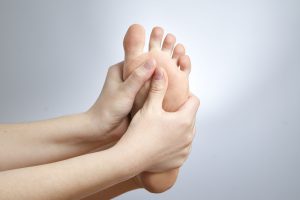Medically Reviewed by Dr. Rachel N. Verville
May 27, 2020

Every year, many men and women visit Dr. Verville with significant pain in the bottom of one or both feet. This common pain, medically known as plantar fasciitis, is most often experienced by men and women in middle-age, or Frisco residents who work long hours on their feet or are very physically active.
Plantar fasciitis is caused over time when small tears occur in the long ligament—the plantar fascia–which runs from the heel to the toes in the bottom of the foot. If you’ve been having pain in the bottom of your feet, and you’re wondering if it could be caused by plantar fasciitis, keep reading. We will discuss the signs and symptoms of this prevalent condition.
Why Does Plantar Fasciitis Occur?
Plantar fasciitis isn’t an acute condition, meaning it doesn’t occur suddenly. Rather, it occurs over time as the plantar fascia is damaged, causing it to become weak, tender, swollen, and irritated. Plantar fasciitis is most often the result of:
- Feet that do not point straight ahead when walking
- Flat feet
- Severely high arches
- Walking, standing, or running on hard surfaces for long periods of time
- Being overweight
- Having tight Achilles tendons or calf muscles
- Wearing shoes that don’t fit well or do not support your feet properly
Signs of Plantar Fasciitis
As plantar fasciitis begins to set in, Frisco men and women most often experience a stabbing pain in the bottom of the foot, near the heel. Others may feel a dull pain or a burning pain. Most often, patients experience the pain in one foot, but it can occur in both feet at the same time as well.
Pain caused by plantar fasciitis is more intense when the heel is stiff. For example, you may notice that this pain is worse in the morning or after you’ve been seated or stationary for a long period of time. Irritation and inflammation can also increase for some patients after walking or standing for long periods of time and is usually worse after exercise.
Diagnosing Plantar Fasciitis
In order to determine whether or not you are suffering from plantar fasciitis, you’ll need to visit Dr. Verville for a full examination in her Frisco office. Most often, we recommend that you schedule an appointment if you have been experiencing swelling or pain in your ankle or other foot joint for more than two weeks.
When you meet with Dr. Verville in her Frisco office for your appointment, she will perform a thorough examination of your foot and will:
- Determine the location of the pain, tenderness, and swelling
- Note your degree of flexibility, alignment, and range of motion
- Test the reflexes of your foot and ankle
Making these determinations will allow her to decide the level of severity of your plantar fasciitis. In addition to a full exam, Dr. Verville will talk to you about the pain you’ve been experiencing, ask you when you first started noticing the pain, answer any questions you have, and develop a treatment plan, which you will begin immediately after your plantar fasciitis diagnosis.
Board-Certified Podiatrist, Dr. Verville, Can Help You Find Relief
If you live in Frisco and have been experiencing pain on the bottom of your foot, it may be caused by plantar fasciitis. In order to know for sure, call RNV Podiatry to schedule an initial consultation with Dr. Verville. You can contact a member of her friendly team by calling (214) 385-8822 today!












